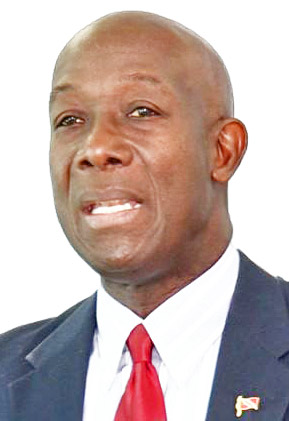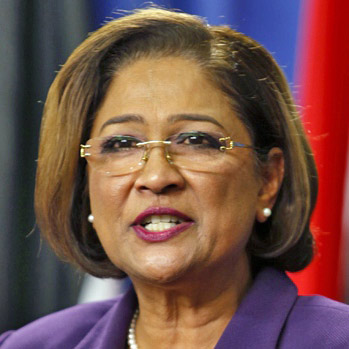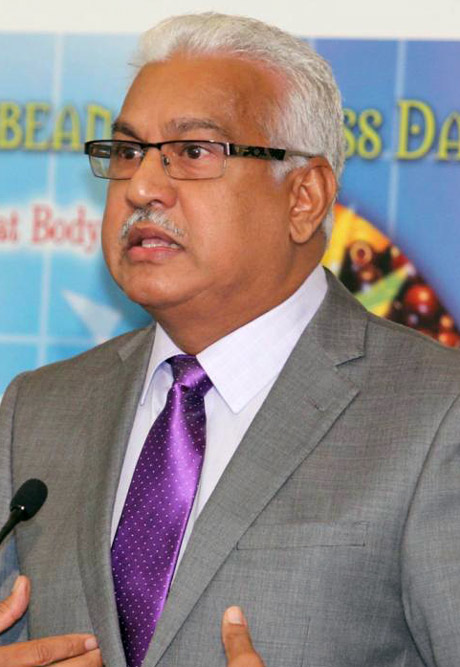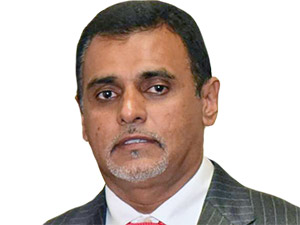Trinidad & Tobago
Alarm over CL Financial profits

Port-of-Spain – Prime Minister Keith Rowley revealed the government recently discovered substantial profits from one of CL Financial’s subsidiaries – Angostura Ltd – had been transferred to a foreign company resulting in the creation of a pool of funds outside Trinidad and Tobago. The revelation came following the government receiving the go-ahead from the courts to appoint joint provisional liquidators to preserve the assets of CL Financial as it seeks to recover a (TT) $15 billion debt following bailout of the conglomerate in 2009.
Rowley said the government had bailed out Clico and CLF-related companies to the tune of more than (TT) $23 billion. However, just about $7.5 billion had been repaid so far. He added the government has remained silent on the issue due to the matter being before the courts.
In an update on the recent history of the Angostura matter, Rowley said upon assuming office the government started inquiring about CLF, although being told the matter was settled.
Said Rowley: “Because we knew that one of those companies, Angostura, was a profitable company, and it must have been earning substantial sums of money. Somewhere along the line, this government started to ask what was happening to the Angostura earnings.”
Up to late last month Rowley said Angostura’s records showed only one payment was made to the government as a repayment for the debt owed in the bailout arrangements. He said he was advised by Finance Minister Colm Imbert the sum was (TT) $500 million. It was all the government had on Angostura’s activity, he said.
“There was great difficulty in getting information (about CLF’s financial position) for months. There are no audited financial statements of these companies. So we couldn’t go to the financial statements and find out,” Rowley said.
The information was very alarming when the government finally received it, Rowley said.
Rowley disclosed the government's recent decision to go to court to have provisional liquidators appointed was triggered, among other things, by the "alarming" discovery that CL Financial was paying 100 percent of Angostura's dividends to a Scottish company, CL World Brands. CLF had justified the sending of this money, which amounted to (TT) $1.1 billion, with the erroneous claim that this company owned 100 percent of Angostura.
In fact, CL World Brands only owned 40 percent of Angostura and 60 percent belonged to two Trinidad and Tobago companies, Rowley said. Clico Investment Bank owns 22 percent of Angostura, while Colonial Life owns 40 percent. Both companies are under Central Bank administration and should have properly received 60 percent (amounting to TT $600 million) of the distribution, with this money going back to the government.
Said Rowley: "When we discovered that, the government was so alarmed by this development that we took steps to have action taken against one particular person who was responsible for facilitating this, and we set about to ensure that there was rectification, to ensure that the Angostura (dividends), 60 percent of which belongs to CIB and CLICO," were properly remitted.
The shareholders response was to demand the government "must get off the board", which would have violated one of the main terms of the 2009 bailout and which had served as "a protection" for taxpayers' money which had been injected into the company, he said.
"The demand that the government withdraw its directors from the board was tantamount to a hostile takeover where the government, that is you, the taxpayer, is removed, with no shareholder agreement in place to cover taxpayers' money," Rowley said.
"For the government to acquiesce to the shareholders owing (TT) $15 billion to taxpayers and expelling the government's directors, allowing the board to fall into the control of directors appointed by the shareholders, in the eyes of this Cabinet, would have been a dereliction of duty on the part of the government of Trinidad and Tobago," he said. The government could not allow this to happen, he declared.
Rowley said money was also gained from the sale of a methanol plant, which went to court after its minority shareholder, Proman, sued over its sale, since it was being done outside of the arrangements of the company’s by-laws.
“And the minority shareholder took the government to arbitration over the government’s intention to sell that plant without giving the minority shareholder its rights of first refusal. The government fought that matter and lost it and the arbitrator instructed that one of the methanol plants be sold. That sale took place and the proceeds came to the government… about $7.5 billion,” he said.
This was all the money collected by the State, Rowley said.
“So it is wrong to say that the government has been raiding these companies and using them for budget support,” he declared.
Rowley said of a debt of approximately (TT) $23 billion, only $7.5 billion has been repaid so far, adding: “So there was $15 billion unattended for years.”
The Prime Minister also dispelled suggestions the government was "coveting" the company.
"This government does not covet these beautiful companies that are up to their eyeball in debt," he said.
He also dismissed as "ridiculous" allegations "made by mischief makers" the government had a secret plan to break up these companies and sell their assets to friends and financiers of the government.
"I want to give the taxpayers and the country's citizens the assurance that there is absolutely no truth in that statement. This government has no intention of conniving with any person, in the one percent, in the ten percent, in the 100 percent, to dispose of these assets. All this government is interested in is ensuring that these entities are in a position to discharge their liability to the taxpayer," he said.

However, Minister of Works and Transport, Rohan Sinanan, has assured all was above-board with the ferry leasings.
Persad-Bissessar also vowed to personally prosecute the case of an injured policeman who cannot access compensation due to the government failing to activate the Protective Services Compensation Committee.
She expressed anger over the handling of tertiary education and her suspicions over the leasing of the ferries.
Persad-Bissessar alleged that one ferry was leased for (TT) $52 million more than its predecessor the Super Fast Galicia, a sum which, she said, could fund 17,000 tertiary students, while another ferry, the Cabo Star, was allegedly costing (US) $7,500 per day more than it should cost, a sum that could fund another 2,500 students.
She called on Sinanan to name the directors and shareholders of Bridgemann, saying they are seemingly not listed in the Trinidad and Tobago Companies Registry.
Persad-Bissessar alleged the firm came to this country in May to give technical advice to the Port Authority and the next month brought two boats which they then chartered to the authority.
“This is scandal of the highest order. No procurement process whatsoever. A company with no track record. This stinks of corruption.”
Sinanan refuted the claims. On claims that one ferry is overpriced by (TT) $52 million, he said this was leased on a short-term contract and represents what was available. After this lease ends, the government will aim for a fresh three-year lease at a better rate.
“Mrs Persad-Bissessar said a lot of things that were not correct,” he said.
Regarding claims the Cabo Star is costing (US) $7,500 per day too much, Sinanan said the government charted the vessel for a price from Bridgemann.
Sinanan likewise queried the claim of Bridgemann visiting here in May, saying, “To my knowledge that is not true. Bridgemann was never hired here as a consultant.” On the claim that firm being unknown, he said Persad-Bissessar should question those doing her research.
HIV/AIDS unknown

Health Minister Terrence Deyalsingh revealed an estimated 11,000 people are infected with the HIV/ Aids in Trinidad and Tobago. He noted 80 percent of the infected were aware of the pathology, and hoped to improve this figure to 90 percent.
“The 90 per cent who know their status should be on drugs, and those who are on drugs should have their viral lode decrease to less than 50 and that is how the world is going to move to being HIV free by 2030, by knowing the population that have it,” he said.
Deyalsingh made the revelations last week when delivering the feature address at the launch of Trinidad and Tobago System of Health Accounts Sensitisation Workshop in Port-of-Spain.
Regarding the cost of treating HIV/Aids, he said due to the lack of data it meant spending was not being accurately measured, but initiatives would be put in place to address this gap.
“What are we really spending as a society on HIV/Aids? But we know we spend about $40 billion a year on drugs,” Deyalsingh said.
He said the $55 million saved on HIV/Aids antiretroviral drugs was due to access from PAHO’s strategic fund. The minister said the drugs were no longer being brought in by local distributors, but were purchased directly from the PAHO fund, resulting in “a lot of profit being cut out.”
Said Deyalsingh: “We reviewed the protocols also for oncology where we would provide a guaranteed supply of a basket of drugs and also for HIV/Aids. Also we are relying more on the PAHO strategic fund to purchase these drugs and this would make the drugs more accessible and more affordable at all the sites that we want to make them available. We have saved $55 million without jeopardising the amount of drugs and we have also ordered more.”
Asked about the availability of HIV/Aids drugs especially in rural areas the minister said such difficulties no longer existed as the protocols regarding drug classification has been reviewed.
He said HIV/Aids strategies were also expected to be strengthened with the reintroduction of the US President’s Emergency Plan for Aids Relief aimed at assisting small countries like Trinidad and Tobago.
Deyalsingh said when the HIV/Aids Coordinating Unit was placed under the previous health ministry it “lost some momentum and focus” and access to PEPFAR funding was temporarily stopped.
“It took me about a year to save PEPFAR and I am hoping we would continue to benefit from PEPFAR in the new financial year. So it’s a total revamp of our HIV/Aids response,” Deyalsingh said.
Regarding the infection rate, he said there was an increase of this in men over 50 and in teenaged girls over 15.
Saying that education was key, Deyalsingh said there could be a “whole new generation coming up” which could be unaware of what the toll of HIV/Aids entailed.

Sinanan’s observations were made after he toured Chester Trace, Debe which, several weeks after the passage of Tropical Storm Bret, had not completely recovered as a large number of drains and culverts were still under water.
“The residents have contributed significantly to the problem,” he said.
He added: “They admit that they filled the land and in doing so, they blocked most of the drainage and that is basically responsible for the problem that they are facing there. Yes, the government has a responsibility, local government and the Ministry of Works, to go in and try to bring some sort of relief, but the problem there is a problem that was caused by the residents.”
Speaking from atop an embankment built as part of the Debe to Mon Desir highway segment, Sinanan said the area’s hydraulic system had to be looked at before any work could recommence on that segment.
He said due to contractual obligations, the government was obligated to complete work which had been started by Brazilian contractor OAS.
He also touched on the perennial flooding which occurs in Port-of-Spain saying there had not been any improvement in the underground drainage system for some time. He said high tides coupled with heavy rainfall usually led to flash flooding within the city, and a temporary solution may involve the use of pumps while the long-term solution may be large retention ponds to store the water during high tides and release it when the tides receded.
Sinanan also sought to dispel reports that no work was being done on the major water courses in south Trinidad, and cited works being performed on the Cuchawan River.
“A lot of work has been going on, the problem we would have had is the storm Bret, there is no way we could engineer for that amount of rainfall, however the problem here is the embankment that we see here, and if you look at the outflows, they are very small. We definitely have to do something about that, but there is a river cleaning program going on and that have started a couple of months ago.”
In a press release issued in response over the issue, the Director of Personnel Administration said that the commission acknowledged the error.
“The omission was in fact brought to its attention by the Service Commissions Department, which provides the secretariat to assist all Service Commissions in preparation of reports, while the Department was preparing the 2016 Annual Report, in keeping with the provisions of Section 66C(2) of the Constitution,” the release said.
It claimed that the department was in the process of bringing the reports up-to-date and that it would be complete by October 1.
“The JLSC apologises to the Office of the President for the omission and wishes to assure that no disrespect was intended to His Excellency or to the Office of the President,” the release added.
The requirement was introduced by Parliament in 2000 when the Constitution was amended to introduce Joint Select Committees of Parliament. Under the amendment, the JLSC is the only service commission exempt from scrutiny from a JSC but is required to submit its annual reports to the President.
After, the reports are then to be tabled in both houses of Parliament.
According to reports, the last report to be submitted and tabled was the one for 2007.
The failure to submit occurred exclusively under the tenure of embattled Chief Justice Ivor Archie, chairman of the commission.
The JLSC has been under public scrutiny since the debacle caused by the short-lived appointment of former chief magistrate Marcia Ayers-Caesar.
The ministry said despite local and global economic trends of falling energy prices, and the urgent need to reduce public spending, the government has provided continued access to tertiary education through means testing and adjusted loan ceilings to help those who may still be unable to meet necessary costs.
Effective August 2017, only programmes and institutions accredited by the Accreditation Council of Trinidad and Tobago will be eligible for funding under the GATE Programme.
However, it added: “[This] policy has not yet been effected, hence it cannot be said that ‘some public institutions are not accredited but access GATE funding’.” Policies governing the GATE programme have been carefully implemented after extensive consultation and review, the ministry noted.
The ministry said from the inception of the GATE programme in 2004 up to the 2015-2016 academic year, the government spent over (TT) $6.3 billion covering programmes that ranged from technical and vocational training to PhD studies.
The government spends substantial sums in support of tertiary level education through national scholarships, Higher Education Loan Programme and the Financial Assistance (Studies) Programme.
It added though the HELP Programme increased its ceiling from (TT) $25,000 to $35,000 for students studying locally, only three percent of the student population has accessed the loans in the past.
The quota system the People’s Partnership government introduced in February 2015 for students enrolled in medical programmes at the University of the West Indies Mona and Cave Hill campuses was rescinded by the current PNM government in December 2015.
In respect of St George’s University, Grenada, only ten students were funded in 2015-2016 with no further intake.
While the government continues to adhere to the mandate of the 2000 Dakar commitment to Education for All, it is important to note that tertiary education participation increased from approximately eight percent in 2002 to the estimated 65.23 percent in 2015. The targeted tertiary participation rate of at least 60 percent by 2015 has been exceeded.
The current level of tertiary participation, the ministry said, “compares favourably with the rate for developed countries”. Giving a background to the current situation, the ministry said the government is experiencing significant reduction in revenues and foreign exchange earnings as a result of the falling prices of oil and gas.
The price of oil has fallen from a high of (US) $128 in early 2011 to a low of (US) $30 in 2015, and currently selling for about (US) $48 representing some 63 percent decline from 2011 to 2016.
When the GATE Programme was established in 2004, oil prices ranged from (US) $40 to (US) $50 a barrel. The subsidy for both postgraduate and undergraduate programmes at that time was 50 percent of tuition fees. In 2004, students who were unable to pay 50 percent of tuition fees, were able to access full tuition on completion of a means test.
As oil prices increased in 2006, the government introduced free tertiary education at the undergraduate level.
While governments in developed and developing countries have over the last decade reduced public funding of tertiary education due to constrained economic circumstances, Trinidad and Tobago is the only country in the English-speaking Caribbean which currently provides free tertiary level tuition support at the undergraduate level.
In 2016, the review of the GATE programme to ensure sustainability of funding found that most of the recipients are from families which fall in the middle to high income groups.
The re-introduction of means testing in 2017-2018 was identified as one of the adjustments that should be made to the GATE programme.
After listening to Williams relate a story from his days as a student, Carmona said the message here is, “We can all disagree, but we can respect when we disagree.” The President added in comparison to the time when he was a young man, “We are experiencing a new type of dynamic, it is called social media.”
He said while social media offers a great opportunity to share information, it is at times “used in a very skewed way to denigrate and to destroy people’s self-esteem.” Carmona urged the students to be “the game changers.” He said they were the ones who would ensure conversations in social media and in day to day living are respectful and based on compassion.
Williams expressed satisfaction that Carmona was taking such an active role in ensuring this country’s young people have a greater understanding of governance. He agreed with the President about the plethora of challenges facing young people today.
“Our education system does not afford them the luxury of having all the qualities they need to navigate this very complex world,” he said.
He added there must be organisations that can assist young people to access the opportunities they need and provide them with the necessary skills to progress in this “very challenging world”.
